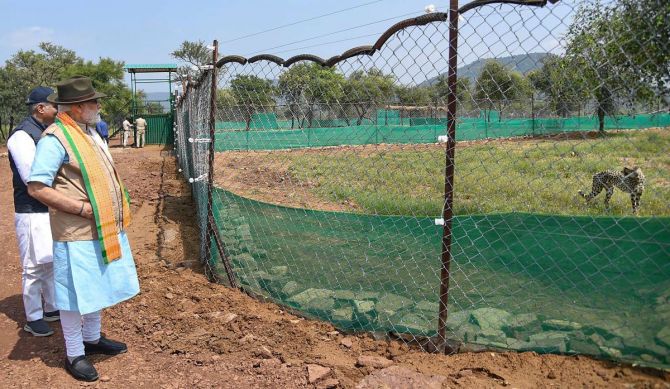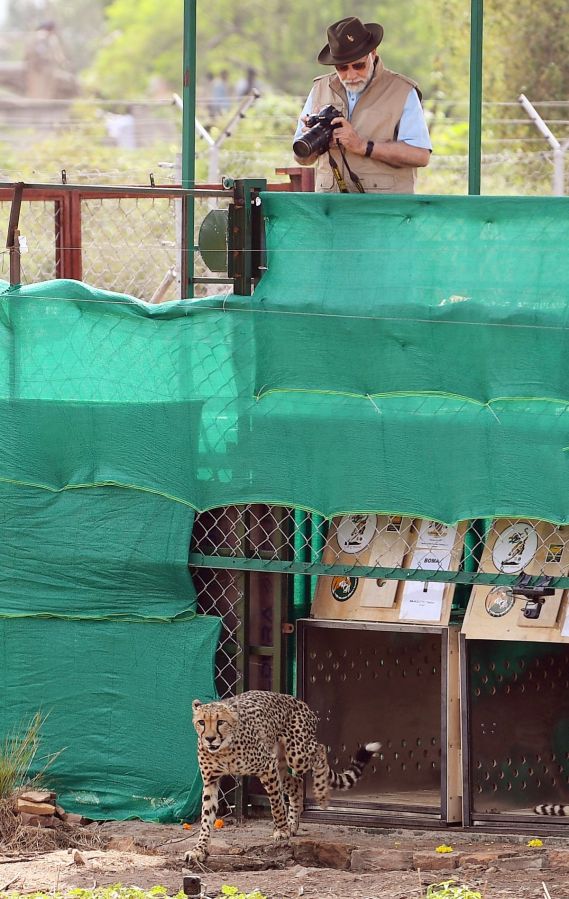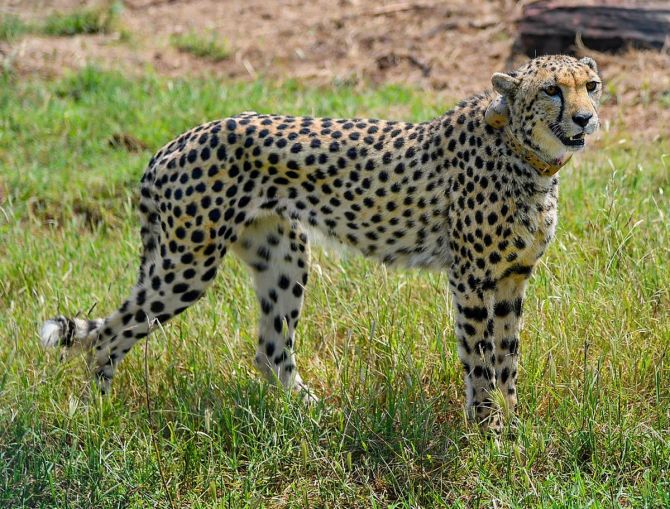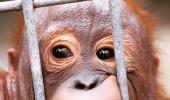Seven decades after they became extinct in India, eight Cheetahs arrived in the country from Namibia by a special flight on Saturday morning and were released by Prime Minister Narendra Modi in Madhya Pradesh's Kuno National Park (KNP).

The cheetahs have been brought as part of his government's endeavour towards environment and wildlife conservation, Modi said.
No 'constructive efforts' were made by the previous governments to revive the population of the world's fastest animal in India, he said.
The transcontinental journey of more than 8,000 km of the eight cheetahs -- five female and three male and aged between 30 to 66 months -- from Namibia began on Friday night.
Around 11.30 am, as the prime minister operated a lever from the high dais, the sliding door of the special cage below opened and the first of the cheetahs stepped into the special enclosure at the KNP, located in the Sheopur district of Madhya Pradesh, as Modi proceeded to click their pictures with his DSLR camera.
Madhya Pradesh Chief Minister Shivraj Singh Chouhan and Union Minister for Environment and Forest Bhupendra Yadav were also present on the dais.
The cheetahs hesitated a little as they took in the new environment with a look of curiosity mixed with bafflement, but soon they found their bearing and began to amble around.

KNP Divisional Forest Officer P K Verma told PTI that Modi released three cheetahs while the remaining five animals were released by other dignitaries.
The quarantine enclosure has been divided into six sections; two sections will house two animals each while other four will house one cheetah each.
"It is unfortunate that we declared cheetahs extinct in 1952, but for decades no constructive efforts were made to reintroduce them in India.
Now, with new strength and vigour, the country has embarked on the project of reviving the population of cheetahs during this 'amrit kaal'," Modi said in his speech as he kicked off the cheetah introduction project conceived by the then United Progressive Alliance (UPA) government in 2009.
"I thank our friendly nation Namibia and the government there for their help to reintroduce cheetahs in Indian soil after decades," he said, adding that only three cheetahs were left in the wild in India in 1947 which were unfortunately hunted.
The last cheetah died in the country in 1947 in Korea district in present-day Chhattisgarh, earlier part of Madhya Pradesh, and the species was declared extinct from India in 1952.
While the 'African Cheetah Introduction Project in India' was conceived in 2009, the plan to bring the big cat to the KNP by November last year suffered a setback due to the COVID-19 pandemic.
"Project Cheetah, under which the cheetahs were reintroduced in the country after they became extinct seven decades ago, is our endeavour towards environment and wildlife conservation. Cheetahs are our guests; we should give them a few months to make Kuno National Park their home," Modi said.
He asked people to wait for some time to give time to cheetahs to make their territory in KNP.
"It is right that when nature and environment are conserved, our future becomes secure. It also opens up vistas for development and progress," the prime minister said.
India is trying to revive the population of cheetahs as per international guidelines and there is a need to ensure that these efforts do not go in vain, he added.
"Cheetahs will sprint again in KNP and will restore grassland ecosystems and bolster biodiversity...Nature and environment, animals and birds are not just the subject of sustainability and security for India, but they are also the basis of our sensibility and spirituality," he said.

He also noted that in the past, the target of doubling the tiger population in the country was achieved before time and the numbers of single-horn rhinos who were under threat have now shot up.
"The count of elephants too has crossed the 30,000-mark. The number of Asiatic lions has risen sharply. Gujarat has emerged as a big centre of lions in the county following the hard work, research-based policies and massive public participation of the last few decades," Modi added.
India is sending out a message to the world that economy and ecology are not opposites of each other, and has shown that a country can progress by protecting the environment, the prime minister said.
Earlier, the modified Boeing 747 carrying eight cheetahs landed at the Gwalior airbase at 7.47 am.
It was operated by Terra Avia, an airline based at Chisinau, Moldova in Europe.
The animals were then flown by two Air Force helicopters to Palpur near the Park, 165 km away. The journey took around 25 minutes.
The Boeing 747 had carried the cheetahs in special wooden crates during the 10-hour journey.
Before the flight, the animals were treated with a tranquilizer drug.
The cheetahs remained without food during the transcontinental journey.
The Kuno National Park, the new home of the cheetahs, is situated on the northern side of Vidhyachal mountains and is spread across more than 700 square km.
Two of the cheetahs imported from Namibia are siblings (brothers) while one malnourished female guest was nursed back to health by a farmer in the African nation, sources said.
After almost a month in the quarantine, they will be put in an acclimatization enclosure for up to four months before being released in the wild.










